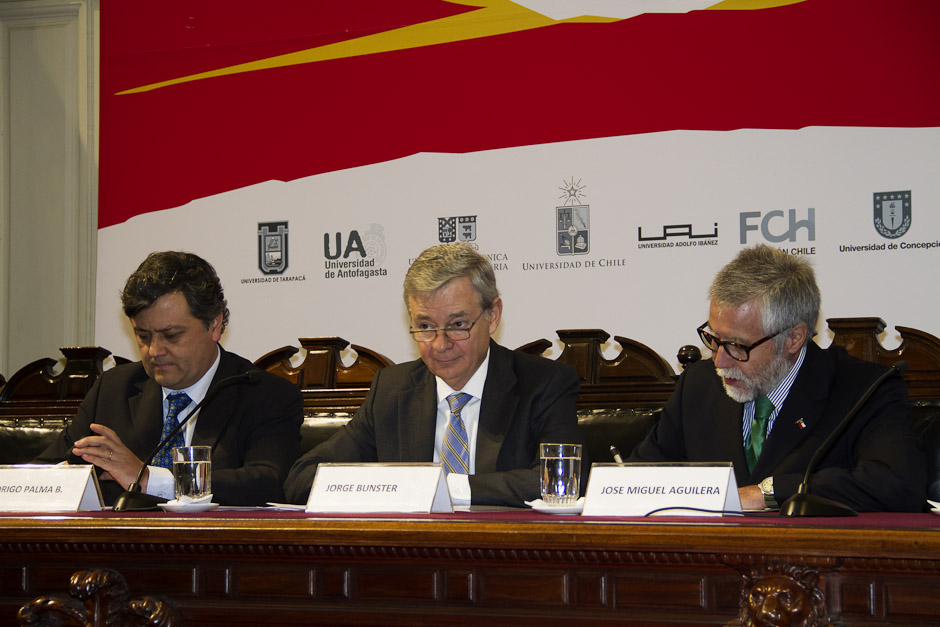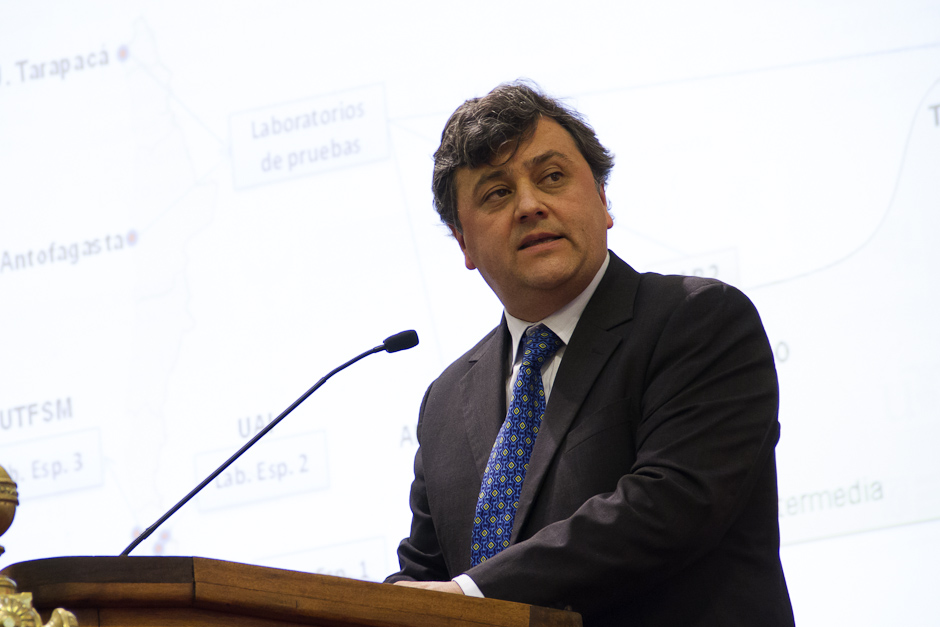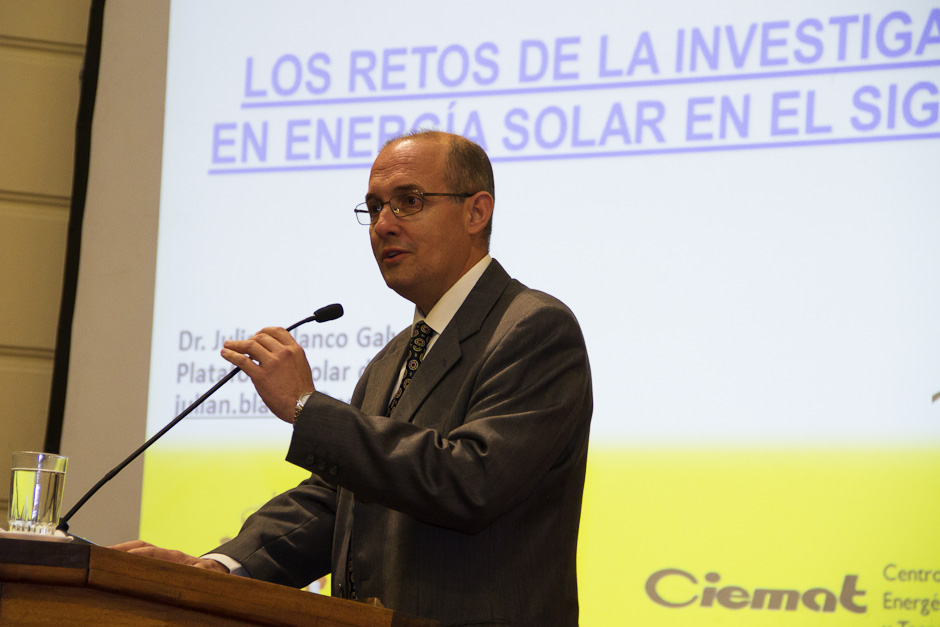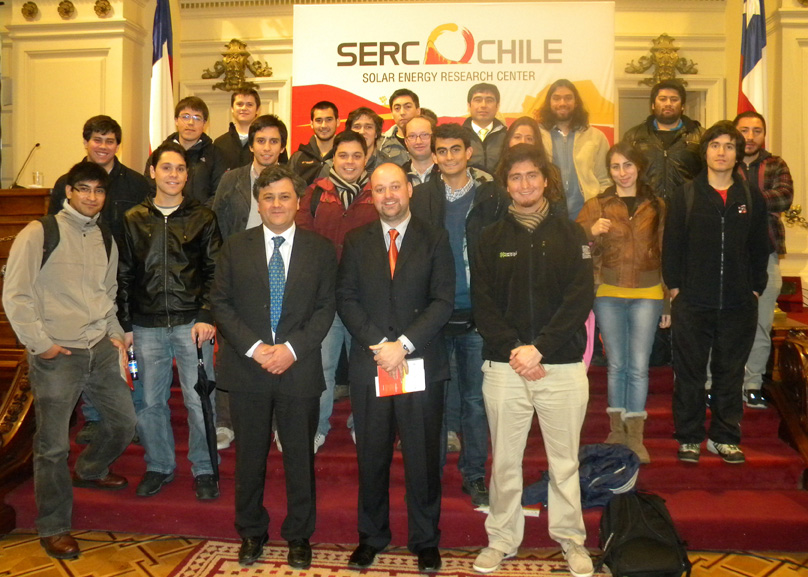
Launching ceremony was held in the Hall of Honor of the National Congress
The universities of Chile, Tarapacá, Antofagasta, Técnica Federico Santa María, Adolfo Ibáñez and de Concepción, along with Fundación Chile, inaugurated on July 5, the first excellency research center on solar energy in Chile (Solar Energy Research Center, SERC Chile), founded thanks to CONICYT’s FONDAP program.
Launching ceremony was held in the Hall of Honor at the National Congress in Santiago, and counted with the presence of the president of the Senate Commission for Future Challenges (Desafíos del Futuro by its Spanish name) Senator Guido Girardi; Ministry of Energy, Jorge Bunster; CONICYT president, José Miguel Aguilera, and SERC Chile director, Professor Rodrigo Palma.
Deans and main university authorities and the Foundation that conform this center were present. This entity seeks to become the leader in scientific solar energy research, with an emphasis on the potential development of Atacama Desert. Likewise, more than 200 special guests arrived to the event, among them government authorities, Congress members, as well as participants of the academic and scientific communities, and body representatives and companies connected to solar energy development in Chile.
The project was conceived after acknowledging the excellent radiation and visibility conditions of the Great North, which makes it an outstanding natural laboratory. However, both in the region and in the world, there are still some barriers which block the full development of this potential and which can be addressed through science. The challenge of SERC Chile is to take advantage of these exceptional conditions and try to give an answer to key scientific questions which aim at overcoming these barriers.
This initiative is led by Professor Palma, together with five researchers of well-known career path, and 40 national and international researchers, who work with a multidisciplinary approach on 6 subjects: solar energy of the mining/industry sectors; high power electric systems with solar energy penetration; solar energy coordination systems for rural and urban communities; solar energy storage; solar water treatment; socio economic aspects and regulatory for the development of solar energy, which were defined in detail during the presentation.
Rodrigo Palma, director of SERC Chile, commented on the motivating factor of this ceremony for the team behind this project. “The event was widely attended, especially by decision-makers that can help us boost this dream. We have an academic view and we don’t know the results yet, but everything indicates that solar energy development is a great opportunity that we should take advantage of in this country,” he explained.
The center’s Advisory Council is formed by: Dr. Andrés Weintraub Pohorille, 2000 National Applied Sciences Award and member of Industrial Engineering Department from Universidad de Chile; Dr. Alejandro Jadresic, Dean of the Faculty of Engineering and Sciences, UAI and former president of the National Energy Commission; Dr. Alejandro Jofré, director of the Center of Mathematical Modeling at Universidad de Chile; Dr. Nicola Borregaard, Energy and Climate Change Manager at Fundación Chile; and María Elena Boisier, director of FONDAP programs and FONDECYT from CONYCIT. Likewise, the center has an international collaboration network which is integrated by the most prestigious solar energy research centers.
In addition, during its nomination, the project was sponsored by the Ministry of Energy and the companies Enel Green Power, Minera Doña Inés de Collahuasi, Abengoa Chile S.A. and Minera Gaby SpA, currently a division of Codelco’s Gabriela Mistral.
In relation to the different bodies which are part of this solar energy center, Professor Palma explained that SERC Chile will have a coordinating role, by connecting the decisions of companies and the real world. “In this area, we would like to create evidence and vision for the bets on innovation and solar energy,” he stated.
Senator Guido Girardi referred to the center’s launching, assuring that scientific development is society’s most important challenge and that the energy model determines civilizations. “Chile has to build more vision of the future as it holds great potential to lead the world’s energy development. Due to the irradiation levels in Atacama Desert, we could even provide energy to all Latin America. Chile could become the main solar research node and it’s only up to science, together with the academia, companies, society and the citizens to make this possible,” he concluded.
SERC Chile seeks to generate new scientific research which creates a solid knowledge foundation in relation to solar energy; to contribute to human capital formation which works together with understanding, the application and promotion of solar energy, and to educate, inform and interact with citizens and the people responsible for public policies on the importance and potential of the solar resources in Chile, making it possible for our country to become a referent of development and solar energy in the world.
International Conference
The International Conference “Solar Energy Challenges in Chile and the World” was held at the end of the ceremony in the same Hall of Honor, where different international guests talked about the different ways to implement solar energy and the important potential Chile has with the Atacama Desert in order to develop it in an effective and sustainable way.
Julián Blanco is in charge of Solar Energy Environmental Applications, from CIEMAT-Almería. He is also an expert in the processes and technologies for solar desalinization of sea and brackish waters and coordinator of the joint Solar Energy Program for European Energy Research Alliance (EERA).
Peter Strittmatter, director of the Astronomy Department at the University of Arizona, United States, and Steward Observatory. He is a specialist on advanced optics and is currently beginning a project on the applications of astronomic technology in the solar energy field.
Radovan Kopecek, Managing Director of Advanced Cell Concepts and member of the Executive Committee, ISC Konstanz, Germany. He is one of the founders of that research center, where he has held the manager and researcher position since 2007. He is currently leading several projects in Germany and Europe in relation to photovoltaic cells.
The program concluded with a panel moderated by Professor Rodrigo Palma where, along with Hugh Rudnick, emeritus Professor from Pontificia Universidad Católica de Chile; and the solar energy expert Roberto Román, held dialogues with the attendees.





